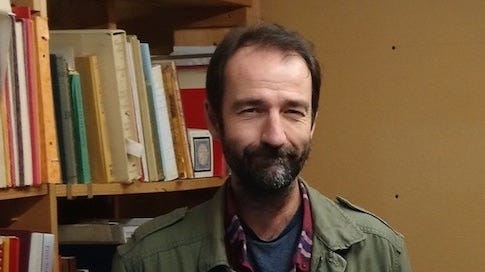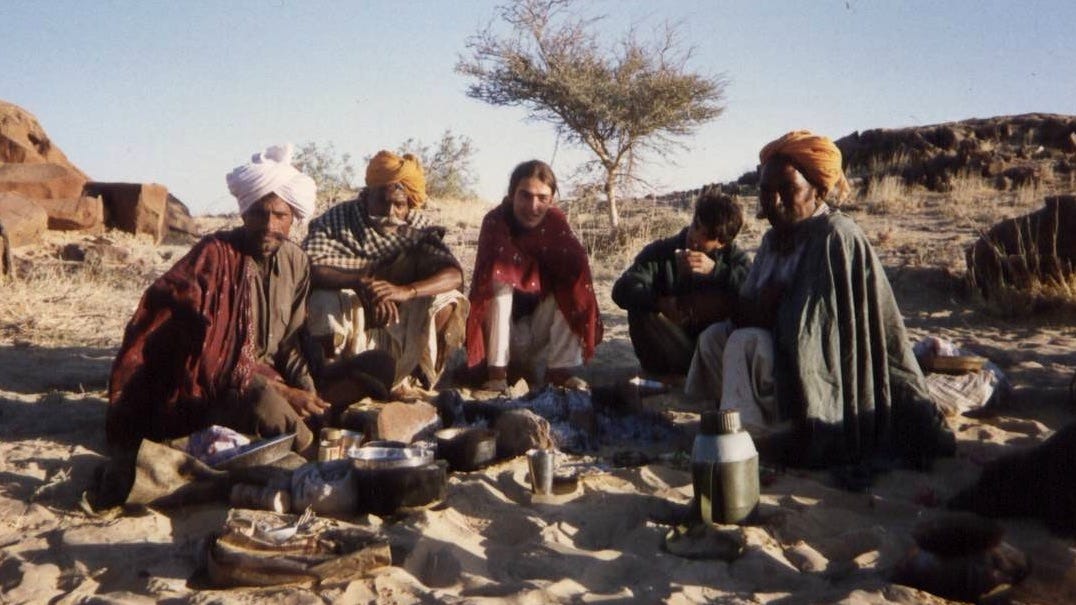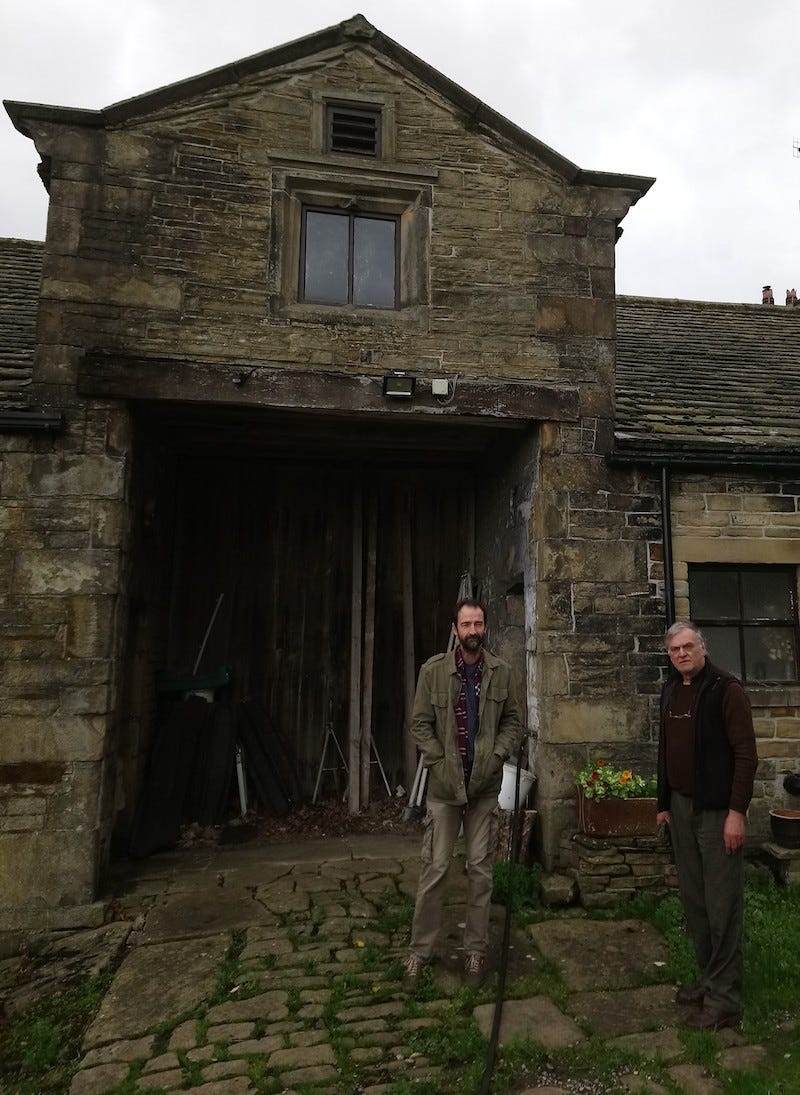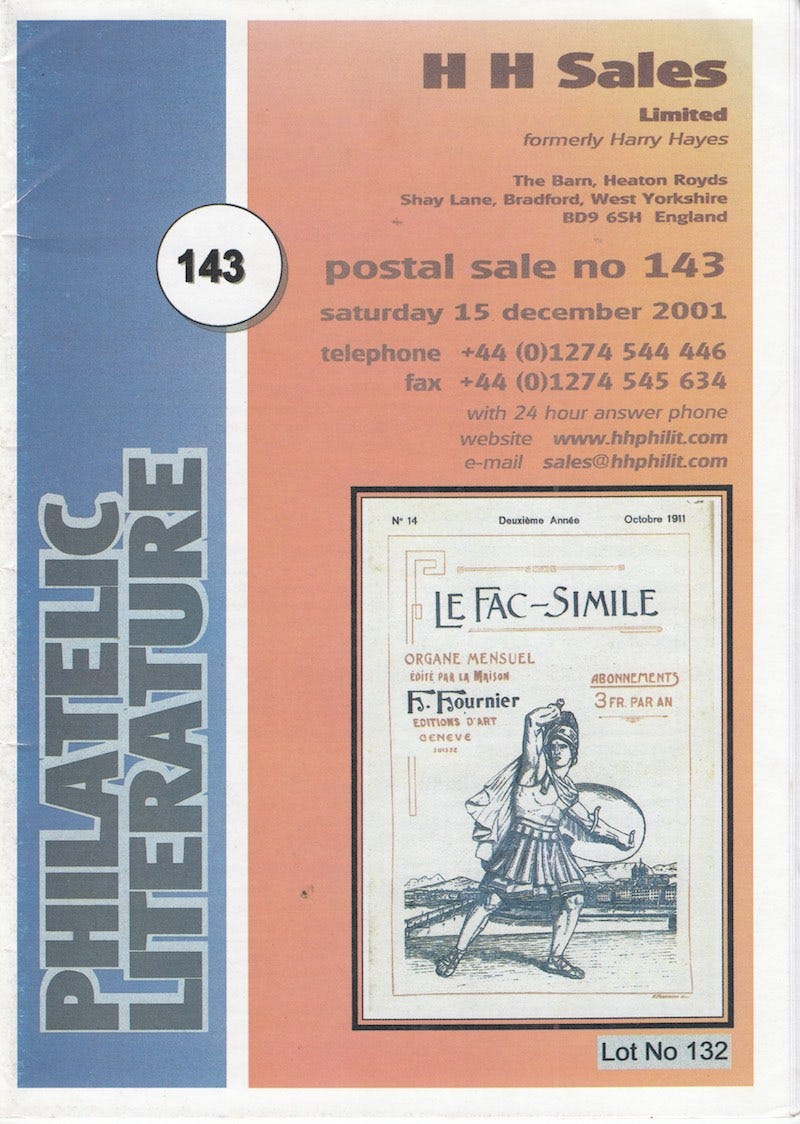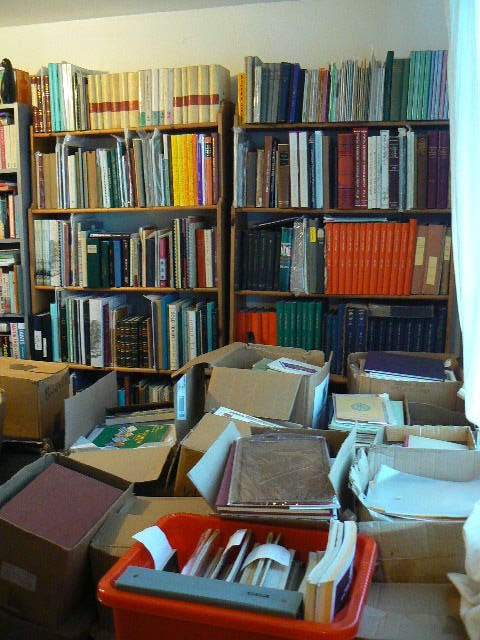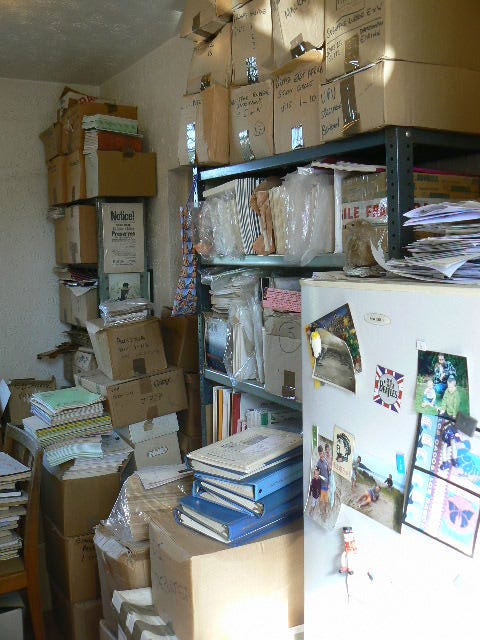The Bookseller of Bradford: An Interview with Casper Pottle of HH Sales
My favourite philatelic literature dealer
This article was first published as “The Bookseller of Bradford: An Interview with Casper Pottle of HH Sales” Philatelic Literature Review 67 no. 4 (Fourth Quarter 2018).
The successor to the venerable Harry Hayes, HH Sales of Bradford near Leeds in Yorkshire, UK, is one of the few full-time philatelic literature dealers in the world. Their stock of literature handbooks, especially those of the British Commonwealth, and English language journals is perhaps the biggest that there is. HH Sales is currently owned by Casper Pottle, who took over the business from its previous owner, Stephen Holder, on 1 January 2016.1 One could say that a third generation is now in charge of this firm.2
My acquaintance with HH Sales and Casper Pottle was made in January 2010 when I hesitantly wrote to them inquiring for a couple of Indian titles. While Casper replied back confirming availability of one of them, I was not sure whether I wanted to start buying literature. Consequently I wrote back to them only in April; Stephen was on the email almost complaining, and rightly so, that they had been holding on to the book for several weeks. I confess that my philatelic literature collection started when I paid for a couple of books3 a month later. Since then I have bought many handbooks and journals from them and they are, no doubt, my favourite bookseller.
Over the many emails that we have exchanged, Casper has invariably been polite and patient. An impression formed in my mind that he would be someone in his late 50s or early 60s, short, waif-like, with sparse hair and round spectacles; not to mention knowledgeable but dull. When I met him for the first time in June earlier this year, outside Apperley Bridge train station where he had come with his college-going son to pick me up, I was confronted by a tall, well built, and smart looking man (no glasses and a full head; well almost, though the beard is recent) who did not look a day over 50, if at all.
While visiting his home, where his books are all stored, I hit upon the idea of conducting an interview with Casper as Ken Stringer had done with Harry Hayes long back, almost half a century ago, in this very journal.4 Casper readily gave his acquiescence though it is only recently that I have managed to send my questions to him. The reader should note that due to issues of distance, the interview is a postal (rather email) one and not done ‘live’; rather similar to the auctions that Harry Hayes and HH Sales used to conduct. However almost all questions have been answered by Casper in his first attempt and few clarifications were subsequently needed; this means that the interview has turned out to be pretty much as it would have if taken face-to-face.
Casper, tell me something about yourself? Where and when were you born and brought up? What about your parents and siblings?
I was born in Bangor, North Wales, in 1970. My mother, Sue, is the daughter of the Olympic athlete Harold Abrahams5 (of “Chariots of Fire” fame). My father, Pat, was a peace campaigner in the 1960s. He was one of the founders of the “Committee of 100”, the anti-war group which used non-violent direct action and civil disobedience to try to bring about nuclear disarmament. In 1964, as private secretary to the Committee’s president, the philosopher Bertrand Russell, he visited India and China as a peace envoy, conducting talks with Nehru and Zhou Enlai6 (the trip did not end well; he was accused of attempting to “incite the Chinese people to overthrow the State” and was deported!). He was imprisoned for organising mass civil disobedience in the UK, and while in prison met the spy George Blake. In 1966, he helped Blake escape from Wormwood Scrubs prison and flee to Russia (where he still lives to this day). My father’s role in the escape was revealed more than twenty years later, and he was finally tried for aiding Blake’s escape in 1991. He argued that Blake did not deserve his “vicious” 42-year jail sentence and that helping him to escape was the right thing to do. The Old Bailey jury agreed and found him “Not Guilty”.7
I have one brother, Julian. He lives in Sydney, Australia, and runs an antiques auctioneer, Pottle Auctions.
I collected stamps as a child, and had three books on the subject: a 1975 Stanley Gibbons Simplified, The Observer’s Book of Postage Stamps, and Collecting Stamps by a certain Stephen Holder!
What did you study? What about your current family?
I went to a tiny village school in North Wales. There were about a dozen pupils for most of the time I was there. In 1981 we moved to London, and I attended the local Comprehensive school. I have two sons; the youngest has just started at University.
When I was visiting you in Bradford you mentioned that you started working for Stephen Holder after coming back from a backpacking tour of India? Why and how did you land up at HH Sales? How old were you then?
Having finished school aged 18 in 1988 I decided to take a year out to go backpacking around India (Figure 2). This was supposed to be a short break from academic study, but on return from India in 1989, and in need of funds, I took up the offer from a friend to help him packing and dispatching books for a “philatelic literature dealer”. My friend’s father had known Stephen Holder for decades, and told me that there were two or three weeks of work available sending out lots from Stephen’s recently ended postal auction (this would have been HH Sales’ auction No. 97).8 The business was situated then in Highbury, North London, not far from Arsenal Football Club’s Highbury stadium. I soon realised that my new employer was the author of one of my childhood stamp collecting books (or “philatelic literature” as I now knew to call it). I still have that copy of Collecting Stamps – now signed by the author of course!
Did you ever think that you would want to go back to studies? Did you ever think you would be working for the Holders for almost three decades and later become the business' owner? What was your future looking like when you took over this job?
My intention back then was to go back to academic studies at some point. What had started as a few weeks dispatching parcels gradually became a full-time job. And then, in 1991, Stephen was offered new business premises at the other end of the country, in Bradford, West Yorkshire. I decided to give Bradford a try, and here I am nearly thirty years later!
Tell me more about your experience of working with Stephen Holder?
Stephen Holder’s knowledge of philatelic literature and philately in general was (and still is) immense. Most of what I know about philatelic literature I learnt from him. At the end of each cataloguing session, we would sit down together and give each book I had catalogued a price estimate for the auction. During these pricing sessions, Stephen would inspect each book and point out any important features that I may have missed. Crucially for me (as someone who hasn’t collected stamps since I was a child), Stephen would often remark as to whether a book was of any practical use to philatelists or if it was merely a ‘coffee table book’ or ‘vanity project’. Stephen had a large working library of his own, and so was able to tell me which books he referred to regularly and which ones he hadn’t looked at in years! If we came across a book which neither of us recognised, the phrase “Not seen before” would often be included in our catalogue description. It is an indication of just how much philatelic literature has been published that after more than twenty five years of working together we were still finding “Not seen before” items on a regular basis.
Over the years I came to realise that Stephen should probably not be employing me (or anyone else for that matter!) Staff wages, rent, and other overheads can be crippling for any small business, and so when I took over HH Sales from Stephen in 2016 I decided to move the whole operation out of The Barn and into my house. Harry Hayes had run his postal auctions from home and I would do the same. Of course, it proved impossible to fit the entire contents of The Barn into my modest house, but most of the books, bound journals, and ‘named’ auction catalogues made the move. Some journals and auction catalogues were left behind, and so I make regular return visits, collecting a few boxes each visit.
What was Judith Holder’s role in the business?
Stephen’s wife Judith ran the office at HH Sales for many years. She would open the mail in the morning, answer the telephone, log all the bids that were made in our postal auctions, and generally keep the administrative side of the business running smoothly. She would also make lunch every day for Stephen and I, the occasional part-time staff, and quite often a visiting philatelist or two.
You mentioned "The Barn". Why don't you elaborate more?
HH Sales was based in “The Barn” (Figure 3) from 1991 to 2015. This was a huge seventeenth century farm building, with ancient oak beams and stone floors. It was freezing cold in the winter and just extremely cold the rest of the time! New visitors to the place would always gasp as they first walked in and looked up at the beams and stone-tiled roof high above (return visitors would always bring warm clothing!). Surrounded by woods and farmland, it was a lovely place to work. There were occasional disasters: burst water pipes in winter, and nesting Barn Swallows in the first couple of summers (they made so much mess that we made sure to keep them from getting in after that).
HH Sales used to come out regularly with auction catalogues in the late 80s till the mid 2000s. What was your role in writing this up?
To begin with I was the “packer” – packaging parcels of books and sending them all over the world. But then, during the lull between auctions, I began cataloguing books for coming auctions. Back then this was done by writing on index cards, which were then sorted into catalogue order and typed up by Stephen. We had several part-time cataloguers in the ‘80s and ‘90s, and it was not until 2001 that I became the sole cataloguer. The first sale where I was responsible for cataloguing every lot was No. 143 – the David Glover library (Figure 4).9 This was a particularly memorable sale for me. Not only because of the exceptional size and quality of David Glover’s library, which had been formed over a very short period of time, but also because I was involved in every phase of the sale from going to the Glover home to pack up the library in boxes, unloading the lorry-load of boxes back at The Barn, cataloguing the lots, and, finally, packing and dispatching the lots to their buyers.
What were your other job responsibilities? Was it something that occupied you full time?
In the early days I worked part-time; then when we moved to Bradford in 1991 I became a full-time employee. A few years later, in the late ‘90s, when my first child was born I went part-time in order to stay at home with my son for a few days a week. I went back to being full-time when my second son started at school.
Which all big-ticket transactions were you involved with in the past and which gave you a lot of satisfaction?
One enjoyable aspect of the job was going out on home visits to collect libraries. The first of these trips I can remember going on was to the home of the late Ian T. Hamilton in 1991. Hamilton had been chief book reviewer for Robson Lowe’s The Philatelist and as such had amassed an impressive library including an amazing array of bound journals. Other trips included a weekend in Eastbourne collecting the huge library of the late stamp dealer Ken Sargeant, and the visit to collect David Glover’s jaw-dropping philatelic library. One occasion I shall always remember was when clearing the house of an eminent Sheffield postal historian who had recently died, we discovered a photographic darkroom hidden behind a panel in the bathroom; it was crammed full with literature which appeared to have been untouched for decades. More recently we cleared the house of our friend and sometime helper at HH Sales the late George Barker. George had always had an impressive library, but when he moved to Bradford and began visiting us on a regular basis, the library grew exponentially. It got so large that when the opportunity arose to buy the house next door he did so. He then knocked a hole through the dividing wall and filled the second house with the overflow of his library!
There are some rare items which I have only seen once in nearly thirty years: Fournier’s Album de Fac-similés was a pleasure to handle, as was a fine unbound set of Volumes 1-10 of The Philatelist complete with Spud Papers, and the Survey of Egypt’s Postage Stamp Issue for the Hejaz. In 2001 we sold a portion of the Sir John Marriott library which consisted primarily of bound sets of rare auction catalogues, including complete bound sets of Ferrari, Praportchetovitch, Caspary, Hind, Yardley, Crocker, Lilly, and others; they will stick in the memory a long time!
Did you ever see any dip in sales in summers and vice-versa? If yes does it still hold true?
We always tried to avoid holding an auction in July/August, as many people (particularly in Europe) are on holiday then. As we no longer hold postal auctions, it is not such a problem. These days, trading entirely online, there is no discernible down-turn during the summer months. While many Europeans may be on the beach in August, it is not necessarily a holiday period for my customers in the rest of the world, and even if you are on holiday you can still be online buying books!
Did the stamp crash of the early 1980s hit literature collecting as well? You must have been past it when you joined?
At age 18 in 1988 I wasn’t really aware of any greater market forces at play. Even now I find it difficult to see whether ups and downs in the philatelic literature business relate to the ups and downs of the economy as a whole.
You must have seen the literature business slowly changing over the time you worked at HH Sales? Please elaborate.
Change was slow at first. Many of the bidders in our postal auctions had been customers since the early Harry Hayes days. As the older generation died out the number of bidders in our sales dwindled (the same situation which faces the UK’s local Philatelic Societies at present). A lifeline came with the advent of the Internet. We found that we no longer had to rely on a dwindling mailing list of subscribers – our customers were now potentially anyone who had access to a computer. We began trading on eBay in 2005, and later on our own website and on Amazon.
After taking over HH Sales, you shifted all the books from The Barn to your house. Your house is a bibliophile's dream come true. But how do you manage to live with so many books everywhere? How does your family cope?
As you have seen, my house is really not big enough to hold all the books I have (Figure 5)! I also have a large garden shed (thankfully dry) which holds some of the overflow from the house. My family is quite used to having an eccentric book dealer (is there any other kind?) and they hardly bat an eyelid when a new vanload of books turns up at the door.
So few of the books you have are listed either on your website or on eBay / Amazon. How do you plan to speed up the current listing process of a few a week? Else you can never get all or even a substantial portion of your stock online.
This is the drawback of being a one-man business. There is never enough time to do everything. It is true that only a small proportion of the stock I have is for sale on the Internet at any one time. Much of the stock that is not currently listed online consists of runs of journals; these are time-consuming to list, as each volume needs to be checked for completeness. But the answer probably lies in listing (and selling) more of these journals (this would have the added benefit of clearing some space in my house!)
Do you buy regularly? What are your sources of building stock? Do you buy libraries?
I am always buying stock. I have bought a couple of good libraries from retired stamp dealers recently, and one or two smaller libraries from collectors who had recently sold their collections at auction. Most of the collectors who come to me to sell their libraries have been customers of HH Sales in the past; they may be downsizing, giving up philately due to failing eyesight, or, sadly, I may be dealing with the family of a former customer who has died.
Who would you consider as your main competitors? What do you think about your stock in comparison to theirs?
The other major philatelic literature dealer in this country is David Druett at Pennymead Books. David and I are friends and don’t really consider each other as ‘competitors’. In Europe, Burkhard Schneider is now the main philatelic literature dealer, and in the US Leonard Hartmann and Phil Bansner. But again I would say that we are not really competitors – there is more than enough material to keep us all busy without worrying about what the others are up to. I haven’t visited the premises of any of my ‘competitors’ in person, so I really can’t compare my stock with theirs – perhaps that is a job for you Abhishek!
Your descriptions of books on your website are quite detailed. How do you manage this? What sources do you rely upon to research and refer to?
I make the assumption that not every visitor to the website is going to be an expert. They may be looking to buy a book as a gift, or they need a book but they don’t know which one covers their specific field of interest. So I try to give as much information as I can in my descriptions. This may be from memory or simply from the blurb on the book’s dustwrapper! For more detailed bibliographic information ‘Crawford’ cannot be beaten, and I increasingly refer to the online philatelic libraries and to the bibliographic works of Brian Birch.
An important question - Why do philatelic literature titles fetch so much less these days as compared to the 1970s - 2000s? Are there fewer collectors of literature as compared to just 20-30 years back? Do fewer books sell than earlier?
You are right that the prices of many of the major handbooks have stayed the same (a fall in real terms) or actually fallen. These are often the great “standard handbooks” on their subjects, which remained the “go to” reference books sometimes for decades. Many highly specialised books have been published in recent years, building on those earlier works, and meaning that specialist collectors may no longer feel the need to own the major handbook on an entire collecting area when they only collect perhaps one issue or era. Take for example, The Postmarks of Great Britain & Ireland by Alcock & Holland. Still considered the ‘Bible’ for GB collectors and once very much in demand, its value has flat-lined for many years. This must be because collectors can now buy a range of more recent specialised publications on, for instance, Maltese Cross cancellations, Squared Circles, etc.
The Internet has also had an effect. Books that were once considered scarce or hard to find can now be found with the click of a mouse, and this must have brought down the prices of some books. However, books that were rare thirty years ago are still rare, and the real rarities of philatelic literature have increased in value. Also, many books that were published in the 1970s and ‘80s and for years retailed at or near their publication price are now hard to find and selling for much more than they once did; for example Spence’s book on Essays, Proofs and Reprints of the 1854 Issue of India sold for around £25 to £30 in 2000; now it is worth £100+.
How do you think philatelic literature will evolve over the next couple of decades?
I firmly believe that reports of the death of the book have been greatly exaggerated. Many stamp collectors also like to collect books. They like the feel a book in their hands, they like to have a library to peruse. CD-ROMs and online resources can be very useful of course, but I don’t believe they pose a threat to actual books.
As the middle classes in countries such as China and India continue to grow, I would expect the literature of those countries to continue to increase in demand and to rise in value.
Literature relating to locals, revenues, and other ‘cinderella’ or ‘back of the book’ issues have increased in popularity over the years too, and I would expect this trend to continue.
As the world gets more crowded, houses are getting smaller, and the days when a serious philatelist kept runs of all the main philatelic journals are probably at an end. CD-ROMs have already been issued of many journals. However, for the serious philatelic bibliophile a complete run of The London Philatelist on their shelves will always be preferable to the digital version.
What do you think you will be doing 20 years down the line?
Nobody becomes a dealer in philatelic literature to get rich. So I won’t be retiring any time soon.
Acknowledgements: I would like to thank Casper Pottle for patiently answering my questions and accommodating my persistent requests for photographs. Any feedback or information can be shared on my email id: abbh [at] hotmail.com.
Stephen Holder’s message on his retirement can be read here: https://www.facebook.com/permalink.php?story_fbid=785677381559472&id=333068910153657. Accessed on 14 Oct 2018.
To be precise, “HH Sales” is a brand name and Pottle runs the business as a sole trader. The company called HH Sales Limited existed when the Holders were its directors; it was closed down when Pottle took over the name, stock, and publishing rights to the Harry Hayes publications.
The first book was Overseas Letter Postage from India 1854-1876 by D.N. Martin and Col. Neil Blair and the second was The Encyclopaedia of British Empire Postage Stamps. Volume III. The Empire in Asia 1775-1950 by Robson Lowe.
See Stringer, K. E. 1971. “All in a Decade: An Interview with Harry Hayes”, Philatelic Literature Review 20 no. 4 (Fourth Quarter): 278-283. Casper would have been a year old then.
Abrahams was an English track and field athlete who won the Gold in the 100 meters sprint at the 1924 Paris Olympics.
Jawaharlal Nehru was the first Prime Minister of independent India from 1947 to 1964. Similarly Zhou Enlai was the first Premier of the People’s Republic of China from 1949 to 1976.
The interested reader may wish to learn more about Patrick Pottle here: https://www.theguardian.com/news/2000/oct/03/guardianobituaries.richardnortontaylor and https://www.telegraph.co.uk/news/obituaries/1368749/Patrick-Pottle.html. Accessed on 6 Oct 2018.
Sale No. 97 was dated 8 Sep 1989. At this time HH Sales was a relatively new company having been formed after the purchase of Harry Hayes’ stock by the Holders in 1986. The first auction that HH Sales had was Sale No. 89 dated 10 Apr 1987 (continuing from the 88 postal sales that Hayes had conducted).
This sale contained the libraries of Sir John Wilson, late Keeper of the Queen’s Collection; well-known GB dealer Donald Forbes-Smith; and of course David Glover. It was the best selection of literature ever offered in any one auction of the firm and consequently its most successful sale.


